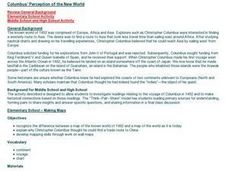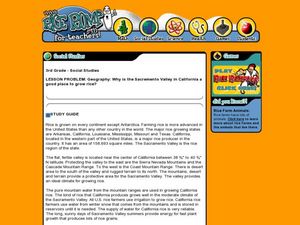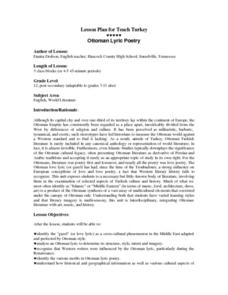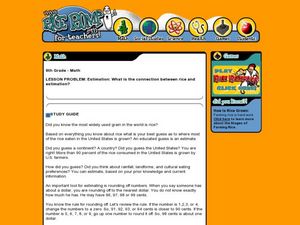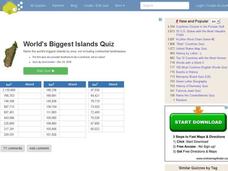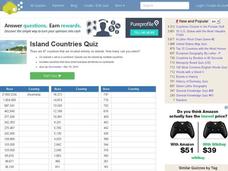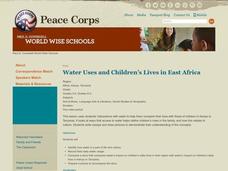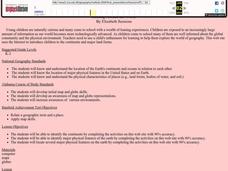Curated OER
Earth Science: In Depth Look at Earthquakes
Students engage in an interactive Internet lesson covering the reasons and results of earthquakes. After reading eyewitness accounts and viewing animations, they use seismograms to measure and locate the epicenters. In an ongoing study,...
Curated OER
Unit 5 - Food
Young scholars study the biodiversity existing in the Amazon rainforest. In this Amazon biodiversity lesson, students study diagrams, maps, and information about the biodiversity in the Amazon.
Curated OER
Columbus' Perception of the New World
students investigate readings relating to the voyage of Columbus in 1492 and to make historical connections based on those readings. They form pairs to share insights and answer specific questions, and share information in a final class...
Curated OER
African Folktales Lesson
Students explore what a folktale consists of as it relates to oral tradition. In this folktale lesson, students are told the African folktale, Why the Sun is Lives in the Sky and make personal inferences about what the folktale is...
Curated OER
African Myths and What They Teach
Students identify and locate the continent of Africa on a globe or map. They locate on a classroom map of Africa the place of origin of the myths/stories being read in class.
They discover that the peoples of Africa and their stories are...
Curated OER
Landmarks in Paris
Third graders create a map of France. They use computers to view an "in flight" movie about Paris. They research Paris using books and the internet. Students practice using the program "Comic Life." They import illustrations for each of...
Curated OER
Oregon Trail Diary
Students write a diary. In this writing and creativity instructional activity, students pretend they are moving west and keep a diary about their adventures. Students study real-life scenarios about families who made the trip out west...
Curated OER
Cranes, Crosswalks, and Big Gulps
Students watch a video and answer questions based on wildlife jobs. In this wildlife lesson plan, students learn that biologists don't just play with animals but that there is a lot of study involved.
Curated OER
A New World and the Emergence of a New Race
Students study specific terms and concepts about the discovery of America. They improve their history knowledge about some Latin American regions and their map and geography skills of the New World. They describe what is meant by...
Curated OER
Japan and The Ring of Fire
Middle schoolers engage in a study of the volcanic forces and earthquakes associated with The Ring of Fire in the Pacific Ocean. The people of Japan are researched in how they have dealt with living in the area. Also students write in...
Curated OER
Geography: Why Is the Sacremento Valley a Good Place to Grow Rice?
Third graders locate the Sacramento Valley in California where rice is grown. In this rice growing location lesson, 3rd graders locate the Sacremento Valley, California on a map, and color the mountain ranges and terrain that is around...
Curated OER
China: How to Put Some "Tang" in Your Medieval Dynasties
Fourth graders label the countries that border China and the physical features of Asia. They discuss the physical features of Asia and label them on the other map.
Curated OER
Brochure of African Countries
Students research a country in Africa and present the information they found and the brochure they designed to the class while their peers take notes to use as a study guide for the exam.
Curated OER
Ottoman Lyric Poetry
Students explore the Ottoman style of poetry. They view a video, Suleyman the Magnificent, and view maps of Europe, Asia, Africa and the Mediterranean Sea. They research the Ottoman Empire and keep a journal. They read various Ottoman...
Curated OER
Gray Whales on the Move
Students study whale migration and their natural history. In this migration lesson students plot whale migration on a map and describe their ecosystems.
Curated OER
What is the connection between rice and estimation?
Sixth graders investigate estimating. In this estimating lesson, 6th graders estimate how much rice is eaten around the world. Students estimate the percentages of rice eaten by other countries. Students compare rice production to other...
Curated OER
The History of Rice
Third graders explore the history of rice. In this history of rice lesson students use a timeline to help determine important events in the spread of rice throughout the world. They use a map to locate rice production in the United States.
Curated OER
World's Biggest Islands Quiz
In this online interactive geography quiz learning exercise, students respond to 20 identification questions about the largest islands in the world. Students have 4 minutes to complete the quiz.
Curated OER
Island Countries Quiz
In this online interactive geography quiz worksheet, students respond to 48 identification questions about island nations in the world. Students have 5 minutes to complete the quiz.
Curated OER
Water Uses and Children's Lives in East Africa
Learners identify how water use is part of life and culture. Students record their daily water usage and compare results with classmates. Learners complete the graphic organizer on water and children. Students compose an essay, which...
Curated OER
Summer Olympics Host Cities Quiz
In this online interactive geography quiz worksheet, students respond to 22 identification questions about summer Olympic host cities. Students have 3 minutes to complete the quiz.
Curated OER
Lowest Fertility Countries Quiz
In this online interactive geography quiz worksheet, students respond to 20 identification questions about countries with the lowest fertility rates. Students have 3 minutes to complete the quiz.
Curated OER
Richest Countries Quiz
In this online interactive geography quiz learning exercise, students respond to 20 identification questions about the richest countries in the world. Students have 4 minutes to complete the quiz.
Curated OER
Reading Around the World
Students use the internet to identify the seven continents. Using maps, they locate and identify major physical features of Earth. They are read different books by various authors on the Earth and answer questions related to it. They...




